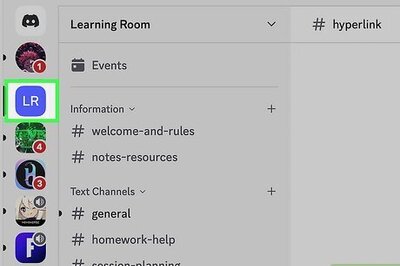
views
What does “No Soliciting” mean?
”No Soliciting” is a sign property owners put up to deter solicitors. It’s meant to signal to salespeople that the homeowner or business owner doesn’t want to be disturbed. You can purchase a “No Soliciting” sign yourself or ask your local police department if they have one you can acquire for a donation fee. Common places to display “No Soliciting” signs include the front lawn, front door, or front-facing window – all prominent locations where solicitors can’t help but see them.
Who qualifies as a solicitor?
A solicitor walks door-to-door selling goods and services. They may take orders for food, publication or service subscriptions, household products, and other commercial or non-commercial items, providing they obtain a permit in the city where they’re working first.
Religious groups and political canvassers don’t count as solicitors. As long as they don’t ask you for money, these individuals can come to your door and knock even if you have a “No Soliciting” sign. You can’t report them as solicitors, but you can report them as trespassers if you don’t want them on your property.
Is it legal to solicit?
Solicitors are protected by the First Amendment. The First Amendment guarantees citizens and businesses in the United States the Freedom of Speech, Freedom of Religion, and other protections. Going door-to-door to sell goods or ask for donations falls under those rights.
The First Amendment doesn’t protect solicitors from city ordinances. Most cities in the US established ordinances that require solicitors to obtain solicitor’s or peddler’s permits. They impose other limitations, as well, such as restricting the hours they can solicit..
Soliciting is not solicitation, which is a federal crime and a felony. Solicitation is when someone persuades, incentivizes, or commands someone to commit a crime. It’s important to distinguish this from soliciting, which is simply selling goods or services house to house.
Does soliciting include passing out printed materials?
Passing out handbills is soliciting if it involves asking for money. A handbill is a pamphlet, brochure, or flyer that advertises or promotes goods, services, a business, or an event that requires an admission fee to enter. It may also have prices or a section to write in your credit card information.
Newspapers and magazines aren’t considered handbills. If you receive any that you didn’t sign up for or no longer want, contact the publisher or distributor and cancel your subscription.
Do “No Soliciting” signs stop solicitors from knocking?
Solicitors can choose to knock on a “No Soliciting” door. However, if they do, ask them to leave and report them to your local police. If you have a “No Soliciting” sign and your name and address are on a no-knock registry, then the solicitor has violated the local ordinance against soliciting you
Solicitors who ignore “No Soliciting” are fined in some cities. The local City Council may also opt to suspend their solicitor’s permit, meaning they will no longer be alloed to sell door-to-door in that jurisdiction.
How to Deter Salespeople from Soliciting You
Join a local no-knock registry. Cities provide no-knock registries to track which property owners don’t want to be solicited. They also give this list to solicitors to ensure they know which houses not to visit. This is like a double layer of protection along with your sign.
Politely tell them you’re not interested and ask them to leave. The solicitor may take the hint and move on to better prospects. Shut the door to avoid engaging in further conversation, as well, or they may think they can persuade you to listen to their sales pitch.
Avoid answering the door when solicitors knock. The knocking and bell ringing may be annoying, but if you don’t answer the door, the solicitors will eventually walk away. They have other sales to try to make, and they won’t want to waste time hoping you’ll answer.
Put up a “No Trespassing” sign instead. In most states in the US, private homeowners and businesses have the legal right to erect “No Trespassing” signs on their property. If anyone ignores the sign, including solicitors, the homeowner may call the police to remove them. You can also press charges against trespassers, providing you can prove that they trespassed on your private property. Security camera footage can serve as evidence for your case.
Ignore and walk past street solicitors. It may feel rude, but remember that street solicitors can be very persuasive. They may even try to guilt-trip you into giving them money if you enter into a conversation with them. The best way to avoid that situation is to continue on your way without acknowledging them.
How Solicitors Should Respond to “No Soliciting”
Avoid approaching a property with a “No Soliciting” sign. If the homeowner or business owner answers the door, they likely won’t buy anything from you because you ignored their sign. Worse, they may call the police and you could be charged a fine or lose your solicitor’s license. Refrain from leaving any handbills such as promotional pamphlets, brochures, or flyers at these addresses, too, as that can also result in a fine or a suspension of your permit.
Refer to the city’s no-knock registry, if they have one. They should provide you with one after you receive your permit. The list will tell you which addresses to avoid, so you can better plan your route for more willing potential customers.



















Comments
0 comment